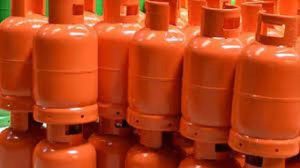
A report indicates that the price of liquified petroleum gas (LPG), also known as cooking gas, has crashed.
According to a market survey carried out by Legit, dealers have crashed the product’s price to ₦900 per kilogramme from the ₦1,300 it sold weeks ago.
LPG dealers have reported improvement in supplies from various depots, saying that the price also crashed due to the relative availability of foreign exchange for import.
A manager at Gasland depot in the Iju-Ishaga area of Lagos, who pleaded anonymity, told the aforementioned publication that the price crash also followed the Nigerian government’s removal of value-added tax (VAT) from the product.
The manager said, “We are witnessing supply improvements, and more marketers can access the products. Also, we have noticed an improvement in forex availability for importers to bring in the product.”
He stated that the deport sold the product at ₦1,300 per kilogramme two weeks ago but crashed the price to ₦900.
He revealed that 12.5kg sells for about ₦10,000 from the ₦14,300 it sold two weeks prior.
Govt Palliative Worsening Food Inflation – Cardoso Reveals
Meanwhile, the Governor of the Central Bank of Nigeria (CBN), Olayemi Cardoso, has identified the government’s bulk purchases of foodstuffs for palliative distribution as a key factor exacerbating the food inflation crisis in Nigeria.
Speaking during the March Monetary Policy Committee (MPC) meeting, Cardoso expressed concerns about the inflationary impact of these purchases, with the details published on the CBN’s official website.
Naija News recalls that the MPC increased the benchmark interest rate to 24.75% from 22.75% in an effort to combat rising inflation.
Despite these measures, the national inflation rate soared to 33.2% in March, with food inflation particularly severe at 40.01%, a significant increase from the previous year’s rate of 24.45%, according to the National Bureau of Statistics.
The spike in food prices comes in the wake of the Federal Government’s decision to eliminate fuel subsidies, prompting an allocation of ₦5 billion to each state and the Federal Capital Territory for food purchases intended for the economically vulnerable. This move, however, has contributed to inflationary pressures.
“Despite notable stability in the foreign exchange market resulting from decisions taken at that 293rd MPC meeting, inflationary pressure remains unabated,” Cardoso stated.
He highlighted that the government’s interventions in the food market have introduced new inflationary dimensions, exacerbated by seasonal fluctuations during religious and festive periods.
Emphasizing the structural nature of the current inflation, Cardoso argued for a combined fiscal and monetary strategy to address the issue effectively.
“This could be considered as evidence of the impact of decisions reached at the 293rd MPC meeting,” he noted, pointing out that primary drivers of inflation now include hikes in food and energy prices due to structural factors.
MPC member Bala Bello also commented on the inflationary trend, noting its impact on the economy.
He said, “Inflation is currently unacceptably high and requires decisive and coordinated efforts to curb it, given its adverse impact on citizens’ purchasing power, investment decisions, and broad output performance.”
Bello acknowledged the government’s initiatives to mitigate food insecurity, such as distributing seeds and supporting dry-season farming, as critical, though insufficient to counter the broader inflationary trends.
The post Cost Of Cooking Gas No Longer ₦1,300, ₦1,200 Per Kg As Supply Improves (See New Price) appeared first on Naija News.
